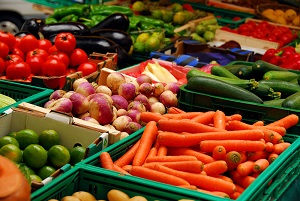
Did you know that there is an easy way to identify. if some produce at a grocery store or farm market is. actually grown organically or not. The Is in the PLU codes on the little labels stuck or the fruit or vegetable.
Produce that is grown organically starts with the number “9” followed by the usual the 4 digits. Examples:
- Conventionally Grown labels:
4130 is the code for an apple which was grown using standard agricultural practices, the usual fertilizers and fungicides . Which may include Monsanto's Roundup herbicide containing Glyphosate) - Organic produce labels:
94130 is the code for an organically grown apple. It is just the code for apples (4130) preceded by the number 9. - Genetically Modified:
84130 is the code for genetically modified (GE or GMO). They add an “8” to the beginning of the PLU code
When is it most important to buy organic?
Admittedly, in this time of super high food costs and inflation, most of us cannot afford to buy all organic foods. Luckily, it is most important only for some crops, while for others is does not matter. How can that be? Simply. Pesticides, fungicides, rodenticides, fertilizers , etc, are applied to the exterior during the growing season. So for crops with a thick peel or exterior - which you do not eat - the edible portion is never in contact with the harmful chemical. Banana, for example.
“The Dirty Dozen” list, produced by the Environmental Working Group and substantiated independently by Consumer Reports, identifies fruits and vegetables which, when conventionally grown. tested positive for at least 47 different chemicals,
The EWG Dirty Dozen list includes:
- Apples
- Blueberries
- Green beans
- Cherries
- Grapes
- Greens: Kale, lettuce, spinach, collard and mustard greens
- Nectarines
- Peaches
- Peppers, both Bell and hot peppers
- Pears
- Spinach
- Strawberries
When does it NOT matter to buy organic?
There are times when you're simply wasting your money if you buy organic produce. It just doesn't matter for things like bananas. on the following list because the pesticide insecticide, fungicide or whatever, simply doesn't ever come in contact with the portion you eat and plants cannot take it up through their roots systemically.
- Avocados
- Bananas
- Coconuts
- All nut crops (pecans, cashews, almonds, peanuts, Wlanuts, etc.)
- Potatoes - IF they have NOT been treated AFTER they were dug up. Unfortunately, most potatoes are heavily treated during storage.
What To do if you cannot afford to buy organic produce?
See these pages for. a list of specific things you can do to protect yourself with produce that has not grown organically.
Click here for salad spinners, washers and other popular kitchen produce accessories
- With this Presto 23 quart pressure canner and pressure cooker, you can "can" everything, fruits, vegetables, jams, jellies, salsa, applesauce, pickles, even meats, soups, stews. Model 01781

- You can make jams, jellies, can fruit, applesauce, salsa and pickles with water bath canners, like this Granite Ware 12-Piece Canner Kit, Jar Rack, Blancher, Colander and 5 piece Canning Tool Set

Find Other Family Fun:
Local Honey, apiaries, beekeepers
Fun Factory tours: factories, places and operations to tour
Road trips and camping resources
Pick Your Own Farms for fruit, veg
Consumer fraud and scams information
Home canning supplies at the best prices on the internet!
Maple Syrup Farms, sugarworks, maple syrup festivals
Environmental information and resources
Farms For Your Event for birthday parties, weddings, receptions, business meetings, retreats, etc.
Festivals - local fruit and vegetable festivals
Pumpkin patches and corn mazes